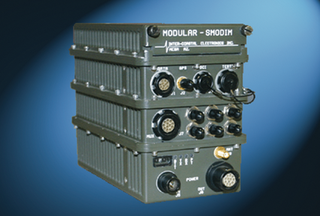Draper Laboratory is an American not-for-profit research and development organization, headquartered in Cambridge, Massachusetts; its official name is "The Charles Stark Draper Laboratory, Inc". The laboratory specializes in the design, development, and deployment of advanced technology solutions to problems in national security, space exploration, health care and energy.
The MIT Lincoln Laboratory, located in Lexington, Massachusetts, is a United States Department of Defense research and development center chartered to apply advanced technology to problems of national security. The Laboratory provides a technical base for military electronics ranging from radars to reentry physics. Research and development activities focus on long-term technology development as well as rapid system prototyping and demonstration. These efforts are aligned within key mission areas. The laboratory works with industry to transition new concepts and technology for system development and deployment. The laboratory also maintains several field sites around the world.

The Johns Hopkins University Applied Physics Laboratory, commonly known as simply the Applied Physics Laboratory, or APL, located in Howard County, Maryland, near Laurel and Columbia, is a not-for-profit, university-affiliated research center employing over 6,000 people. The Lab serves as a technical resource for the Department of Defense, NASA, and other government agencies. APL has developed numerous systems and technologies in the areas of air and missile defense, surface and undersea naval warfare, computer security, and space science and spacecraft construction. While APL provides research and engineering services to the government, it is not a traditional defense contractor, as it is a UARC and a division of Johns Hopkins University. APL is a scientific and engineering research and development division, rather than an academic division, of Johns Hopkins.
The Electronic Systems Laboratory (ELSYS) is one of eight labs in the Georgia Tech Research Institute and one of three labs under the Electronics, Optics, and Systems directorate. Among its research focuses are systems engineering, electronic warfare, and human systems integration.
The Aerospace, Transportation and Advanced Systems Laboratory (ATAS) is one of eight labs in the Georgia Tech Research Institute and one of three labs under the Sensors and Intelligent Systems directorate. ATAS develops advanced systems concepts and performs research related to aerospace systems, power and energy systems, threat systems, intelligent autonomous systems, and systems engineering methodologies. The lab also develops advanced technologies and performs research in a range of areas relevant to aerospace and ground transportation as well as to national defense.
The Information and Communications Laboratory (ICL) is one of eight labs in the Georgia Tech Research Institute. Along with the GTRI Cyber Technology and Information Security Laboratory, it is part of the Information and Cyber Sciences directorate. It conducts a broad range of research in areas of computer science, information technology, communications, networking, and the development of commercial products from university research.
The Sensors and Electromagnetic Applications Laboratory (SEAL) is one of eight labs in the Georgia Tech Research Institute and one of three labs under the Sensors and Intelligent Systems directorate. SEAL researchers investigate radar systems, electromagnetic environmental effects, radar system performance modeling and simulations, and antenna technology.
Theodore A. Postol is a professor emeritus of Science, Technology, and International Security at the Massachusetts Institute of Technology. Prior to his work at MIT, he worked at Argonne National Laboratory, the Pentagon, and Stanford University.
Douglas Taylor "Doug" Ross was an American computer scientist pioneer, and Chairman of SofTech, Inc. He is most famous for originating the term CAD for computer-aided design, and is considered to be the father of Automatically Programmed Tools (APT) a language to drive numerically controlled manufacturing. His later work focused on a pseudophilosophy he developed and named Plex.
Aeronautical Development Establishment is a laboratory of India's Defence Research and Development Organisation (DRDO). Located in Bangalore, its primary function is research and development in the field of military aviation.

Stephen Edward Cross is the executive vice president for research (EVPR) at the Georgia Institute of Technology (Georgia Tech), a position to which he was appointed in 2010. As EVPR, Cross coordinates research efforts among Georgia Tech's colleges, research units and faculty; and provides central administration for all research, economic development and related support units at Georgia Tech. This includes direct oversight of Georgia Tech's interdisciplinary research institutes, the Georgia Tech Research Institute (GTRI), the Enterprise Innovation Institute (EI2) and the Georgia Tech Research Corporation (GTRC).

Interactive Scenario Builder (Builder) is a modeling and simulation, three-dimensional application developed by the Advanced Tactical Environmental Simulation Team (ATEST) at the Naval Research Laboratory (NRL) that aids in understanding the radio frequency (RF) environment.

Chengdu University of Information Technology is a provincial key university co-governed and co-sponsored by China Meteorological Administration and Sichuan Province in Chengdu, Sichuan, China.

William L. "Bill" Melvin is the deputy director of Sensors and Intelligent Systems at the Georgia Tech Research Institute. He is a former director of the GTRI Sensors and Electromagnetic Applications Laboratory (SEAL).
The service-oriented computing environment (SORCER) is a distributed computing platform implemented in Java. It allows writing network-programs that operate on wrapped applications (services) to spread across the network. SORCER is often utilized in scenarios similar to those where grids are used in order to run parallel tasks.

The Smart Onboard Data Interface Module (SMODIM) is used by the United States Army and foreign militaries for live simulated weapons training on military platforms. The SMODIM is the primary component of the Longbow Apache Tactical Engagement Simulation System that provides weapons systems training and collective Force-on-Force live training participation.
Kongsberg Geospatial is a Situational Awareness and Geospatial Visualization software company located in Ottawa, Ontario, Canada. It was founded in 1992 as Gallium Visual Systems Inc. and purchased in 2006 by Norwegian Defence firm Kongsberg Gruppen. It currently operates as a subsidiary of Kongsberg Defence & Aerospace and in 2012, officially changed its name to Kongsberg Gallium Ltd. In 2016, the company changed its name again to Kongsberg Geospatial.
The K.L.E Society's KLE Institute of Technology (KLEIT), is an engineering college in Hubli, India. Established in 2008, it is one of the institutes under the banner of Karnatak Lingayat Education Society(KLE). KLEIT is approved by the AICTE and recognized by University Grant Commission of India. KLEIT is affiliated to Visvesvaraya Technological University, Belgaum for its BE, MCA and M.Tech courses.









